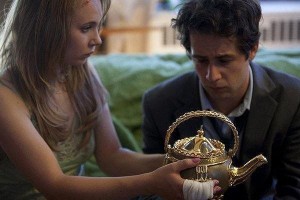“The Brass Teapot” might not be your cup of tea

By Kyle Garrett
There is a teapot gives you all the money you could possibly want upfront, but there’s one string attached: you have to injure yourself or somebody else. Do you do take it anyway?
Released in April, Ramaa Mosley’s debut film “The Brass Teapot” aspires to be a “Monkey’s Paw” tale — that is, a “you have three wishes, but at a price” type of story — for the days of the 2008 recession and a very literal take on the masochism of American society.
It’s a clever concept, inextricably tying social advancement with the pain and suffering of oneself or others, as well as a certain ruthless nature and disregard for fellow humans.
Unfortunately, what could have been interesting satire is dulled into a watchable but underwhelming film by indecisive direction, an unfortunate and predictable plot and characters who never quite manage enough humanity to make the audience care about their fate.
Our tale starts with lovestruck but destitute newlyweds John (Michael Angarano) and Alice (Juno Temple) Macey. The two do their best to get by despite repeated harassment from landlord Arnie (Billy Magnussen), Alice’s inability to find a job with her art history degree and John’s low-paying telemarketing job that forces them to regularly go for long periods without food.
They hate their rich ex-schoolmates like Payton (Alexis Bledel) and express superficial frustration, but are happy together in that shallow way that can only come from a writer who has never had to deal with economic hardship who thinks they can speak for those who have.
Before long, John is first in a wave of firings that leaves the couple with income, just in time for a chance car crash near an antique shop.
Nobody is hurt, but Alice is drawn by some unseen force to enter the shop, run by an elderly Hasidic woman, where she steals the eponymous teapot. One accident with a curling iron later, and both dive into the wealth-for-pain scheme.
John is and remains reluctant but Alice is almost immediately swallowed by greed and ambition. Think of Alice as a millennial Lady Macbeth, driving the pair on despite confrontations with the landlord. The old woman’s violent grandchildren, intent on reclaiming their heirloom and a Chinese scholar who tries to warn them of the teapot’s evil power and the need to dispose of it.
It shouldn’t surprise anyone that he is right; as the artifact’s bloodlust and corrupting influence grows, John compares it to Tolkien’s One Ring, and he doesn’t seem far off, especially given the teapot’s grim origins.
The resulting mix should have been interesting, but doesn’t know what it wants to be. It is a dark comedy with no actual humor, just violence; a satire dulled by reluctance to really let fly and lack of anything to say not said better before; a morality play that condescends to the lower class while demonising wealth and attempts at self-betterment. It hits all the obligatory notes and moral turnarounds, but any character development is abrupt and perfunctory. This is a world of cardboard people — at best one-note and inconsistent and at worst obnoxious — who move not as fits their character but as the script demands. The glimmers of promise are choked out by heavyhandedness and cynical slapstick.
“The Brass Teapot” is a film that could have been much better, and while it’s a serviceable use of two hours, the time is spent mostly looking for what could have been.
